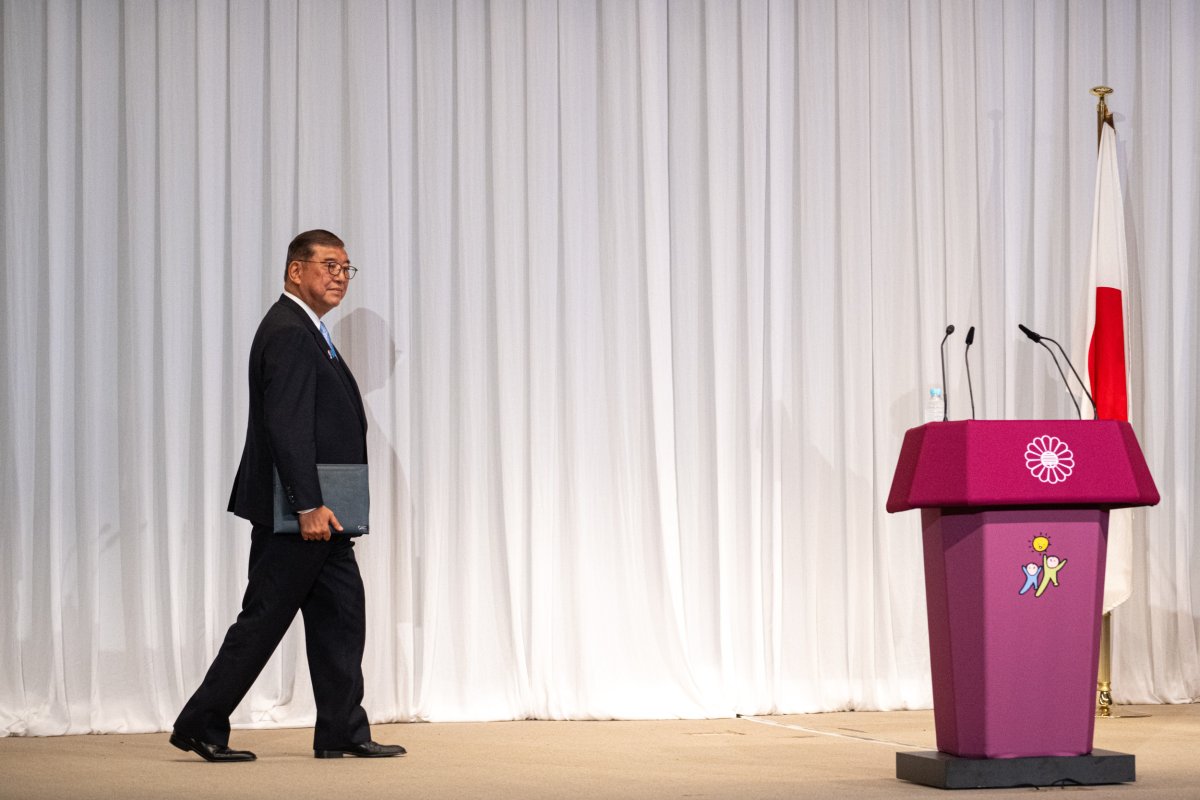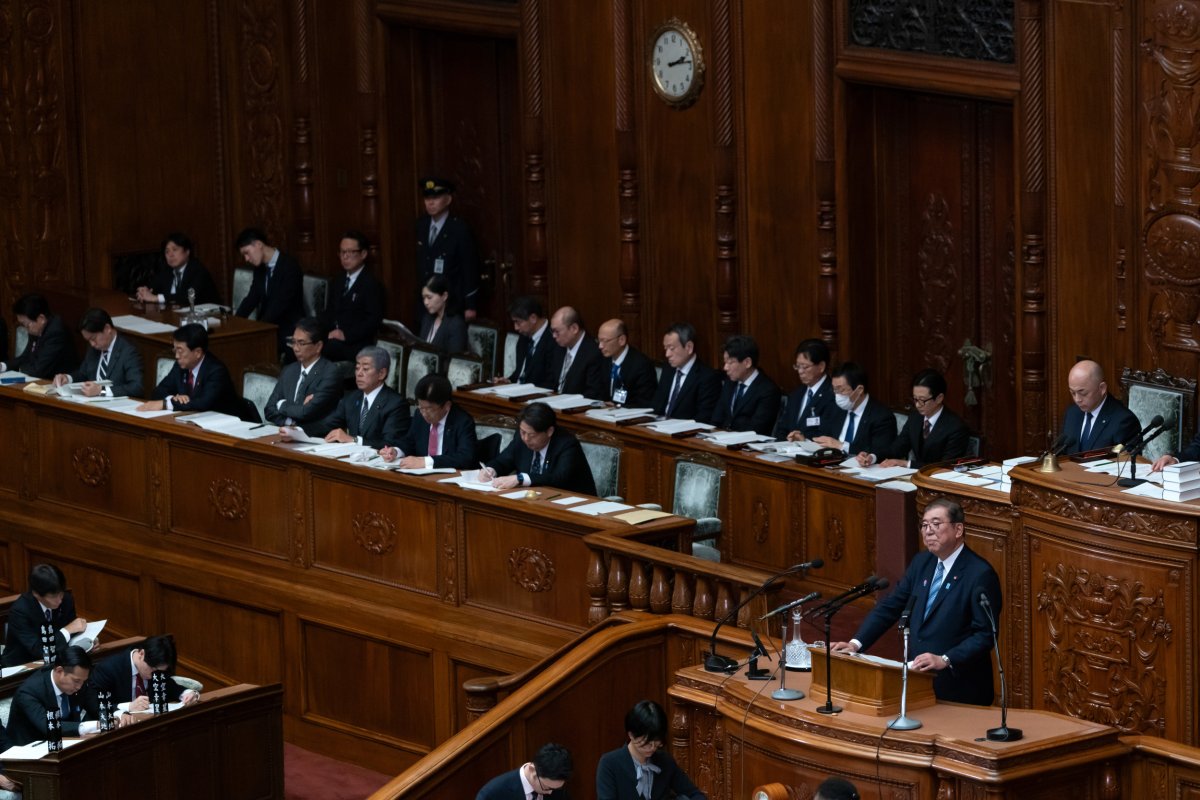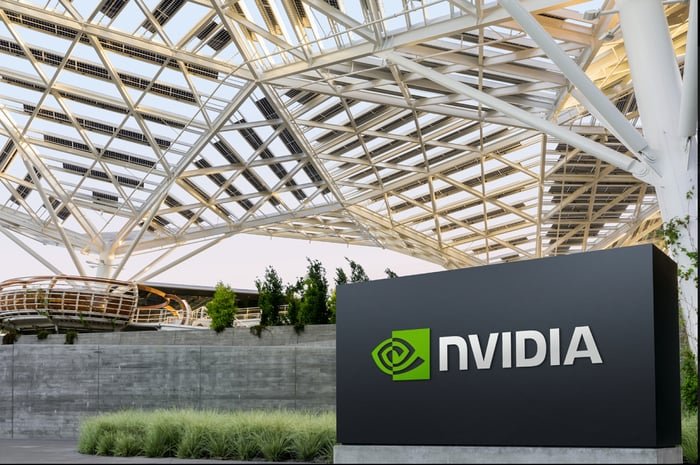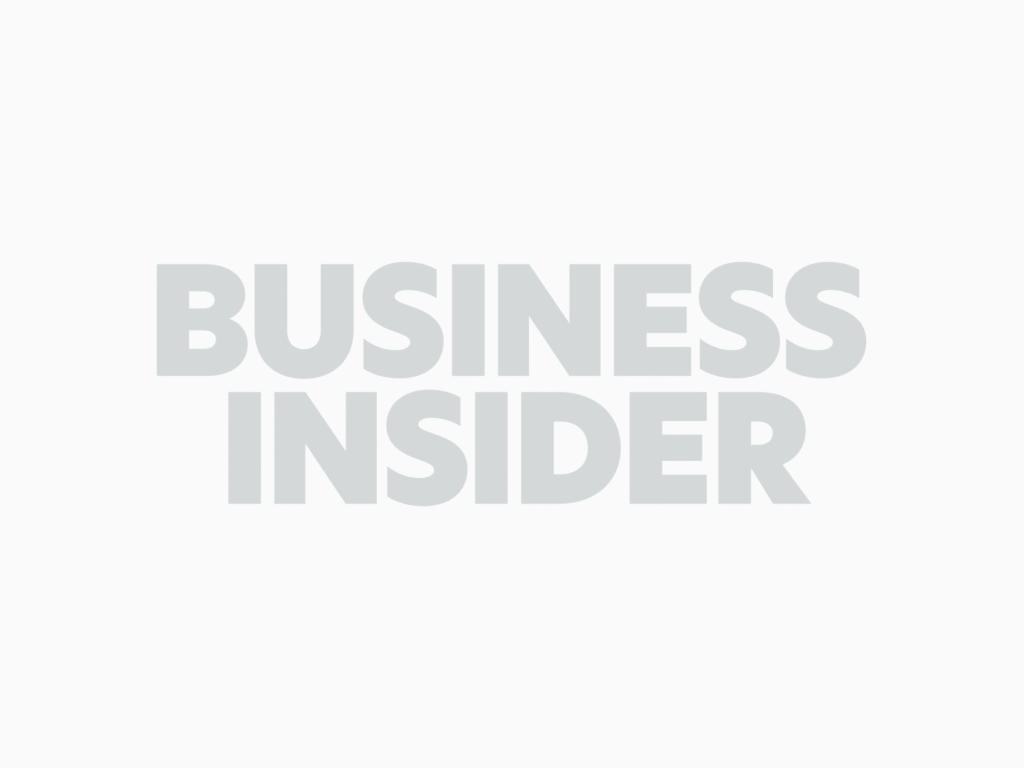When President Donald Trump revealed that his administration had struck a “massive” trade and investment deal with Japan, he described it as “completed”—but it must still pass the Japanese parliament, called the Diet, which is riven with political turmoil.
The deal will likely require—at least in part, if not in full—approval by the Diet, where Prime Minister Shigeru Ishiba’s coalition government very recently lost its majority in the upper chamber, having already become the minority in the lower chamber in 2024.
A Japanese lawmaker in the lower house, who chairs a key policy committee of the left-leaning Constitutional Democratic Party of Japan (CDP), the main opposition, told Newsweek they are closely scrutinizing the Trump deal to assess whether they are satisfied with it. They will then decide how to proceed.
Ishiba, of the right-wing Liberal Democratic Party (LDP), still the largest party in the Diet, said he would stay on to see through the implementation of the U.S. trade deal, rather than cave to calls for his immediate resignation and create a political vacuum.
Analysts said that opposition parties may seek to criticize Ishiba and the deal, but the alternative of blocking it in the Diet could backfire and lead to higher tariffs.
Newsweek has contacted the Office of the U.S. Trade Representative for comment.

U.S. President Donald Trump speaks during a joint press conference with Japanese Prime Minister Shigeru Ishiba in the East Room at the White House on February 7, 2025 in Washington, DC.
Andrew Harnik/Getty Images
Why It Matters
Trump has said he will make deals that benefit both sides, hailing his unique abilities to do so. But the intense “America First” messaging surrounding Trump’s deals poses a challenge for U.S. trading partners.
They must balance Trump’s demands against their own national interests, economic needs, and views of voters, while projecting a degree of strength and independence to show they are securing gains and not merely surrendering to Washington.
The Japanese deal, whose advantages to the U.S. Trump has heavily emphasized, highlights the potential vulnerability of these agreements to domestic politics.
Trump’s Japan Trade Deal
The deal was struck ahead of Trump’s August 1 deadline, when, in a letter to Ishiba, he had said Japanese imports would face a 25 percent tariff in the U.S. if negotiations failed to bear fruit.
Trump had previously questioned the strategic U.S.-Japan partnership, including a long-standing security agreement with its key East Asian ally, citing what he said was an unfair set of trading terms because the Japanese market was too closed off to Americans.
Trade talks between the two sides had been stuck on imports of American rice in particular. But negotiations continued, and Trump revealed the deal in a post on his Truth Social platform on Tuesday, July 22.
Trump said Japan had agreed “at my direction” to invest $550 billion into the U.S.—spanning energy, semiconductors, critical minerals, pharmaceuticals, and shipbuilding—but that 90 percent of the profits from these would be kept by the U.S.
He also said Japan would open up to American car and truck exports, rice and other agricultural products, and more goods. Japan would still face a 15 percent tariff, Trump said, but U.S. businesses will have a zero tariff.
Among the specific measures in the deal are a Japanese commitment to immediately increase rice imports from the U.S. by 75 percent and a Japanese purchase of 100 Boeing aircraft, according to a White House fact sheet.

Japan’s Prime Minister Shigeru Ishiba attends a press conference at the Liberal Democratic Party (LDP) headquarters on July 21, 2025 in Tokyo, Japan.
Philip Fong – Pool/ Getty Images
Japan’s CDP Will ‘Carefully Scrutinize’ Trump Deal
Kazuhiko Shigetoku, a lawmaker in the Diet’s lower house from the opposition CDP, told Newsweek that the deal means “the uncertainty of the economic outlook has eased.”
“However, in terms of the perspective of the national interest, we need to carefully scrutinize the content of the agreement to determine whether it is satisfactory and how it will affect the Japanese economy,” Shigetoku said.
“We will determine our future actions based on explanations from the government at the Diet and other meetings. Although the need for congressional approval is unclear at this stage, we believe that it is important to maintain and expand free trade.”
Mixed Reactions in Japan
Ishiba’s recent election loss was driven in large part by voter frustration with rising prices while wage growth is slow. His weakened minority government must now push through a hard-fought trade agreement, one that Trump has touted as a major win for the U.S.
“Early reactions among Japanese lawmakers have been mixed, with the Ishiba administration touting the deal as a success and members of the opposition claiming it is bad for the Japanese economy,” Kristi Govella, Associate Professor at the University of Oxford and Japan Chair at the Center for Strategic and International Studies (CSIS), told Newsweek.
“For Japanese people, trade negotiations with the U.S. have been seen as a litmus test of the current government’s leadership ability, so politicians are currently fighting to control the narrative about how good this deal really is for Japan.”
Kazuto Suzuki, professor at the Graduate School of Public Policy at the University of Tokyo, Japan, and director of the Institute of Geoeconomics at International House of Japan, said the Trump deal was “well received by both the ruling and opposition parties.”
“Given that many lawmakers did not expect the Ishiba administration to succeed in reaching an agreement, the fact that it was achieved came as a surprise,” Suzuki told Newsweek.
“Moreover, while it was considered difficult to lower tariffs on automobiles and automobile parts, the fact that they were reduced to 15 percent is highly regarded.
“However, this does not compensate for the major defeat in the Upper House election on July 20, and criticism of Prime Minister Ishiba is growing.”
He added: “It is unlikely that the Diet will reject this agreement. If it were to reject it, higher tariffs would inevitably be imposed, which would benefit no one.”

Japanese Prime Minister Shigeru Ishiba delivers his policy speech during a plenary session at the lower house of parliament on January 24, 2025, in Tokyo, Japan.
Tomohiro Ohsumi/Getty Images
Japanese National Interest
Govella said opposition parties “have a great deal of incentive to criticize the trade deal and to capitalize on the weakness of the Ishiba government,” but “actually blocking the deal’s approval could backfire badly.”
Higher tariffs “would have significantly worse impacts on the Japanese economy and on Japanese people who are already feeling the effects of inflation,” she said.
Japanese voters have “generally been skeptical about the opposition’s ability to lead” after their experience with the Democratic Party of Japan from 2009 to 2012, she continued.
“So if the current opposition parties are perceived to be acting against Japan’s national interest by blocking this deal, they could lose the supporters they’ve recently gained,” Govella said.
What People Are Saying
President Trump posted to Truth Social: “We just completed a massive Deal with Japan, perhaps the largest Deal ever made … This is a very exciting time for the United States of America, and especially for the fact that we will continue to always have a great relationship with the Country of Japan.”
Prime Minister Ishiba told reporters, per The Wall Street Journal: “The government was determined to protect national interests,” adding that the deal “will lead to Japan and the U.S. working together to create jobs, produce high-quality goods, and contribute to fulfilling various roles in the world going forward.”
What’s Next
Japanese lawmakers are scrutinizing the trade deal with the U.S.. They are unlikely to block it should they be called to vote on some or all of its components, though the Ishiba government no longer has a majority in either house of the Diet, complicating its passage.







